Bringing female genital cutting to the forefront: How Sahiyo helped Nevin Sutherland attend the 2024 Asian Studies Conference
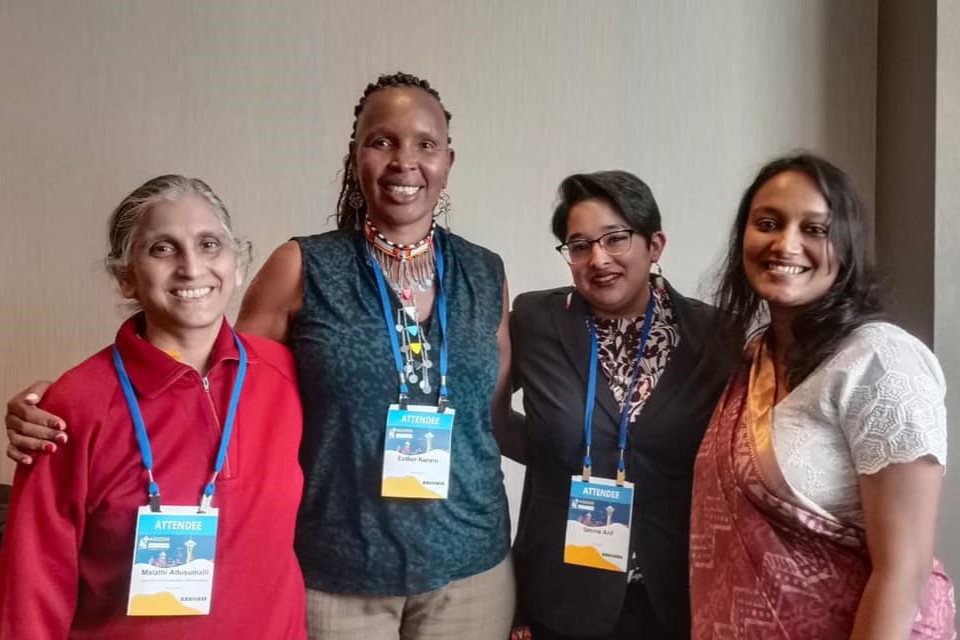
This past March, Sahiyo had the honor of supporting Nevin Sutherland in attending the Association for Asian Studies 2024 Annual Conference. This annual conference focuses on facilitating conversations about and around Asian cultures. Nevin, a current PhD student at Delhi University, sought to highlight the issue of female genital cutting (FGC) in the hopes of sparking a larger discussion about how the practice is ongoing in many parts of Asia. “As the daughter of a single mother and a PhD student, there’s no way I would have been able to attend the conference and put together the panel without Sahiyo’s help,” Nevin said. “They gave me connections to the other panelists, and they also gave me a travel scholarship. This support allowed me to attend my first international conference and gave me more confidence in the work that I am doing.” With Sahiyo’s support, Nevin assembled a panel of fellow Sahiyo volunteers and contacts to facilitate the discussion: Huda Syyed, Umme Kulsoom Arif, Esther Kenesoi, along with Nevin herself. Their goal was to educate the audience about the complexities and nuances of FGM/C in Asia, discuss how FGM/C in Africa often receives more worldwide attention, and explore the underlying gender and sexual politics that keep the practice alive in so many communities. “Our panel was under the category of South Asian studies. We were placing FGM in the context of South Asia and comparing it with the practice in Africa. We wanted to look at how even now most of the FGM/C discourse is largely focused within Africa. We compared what the different dynamics are in African and Asian communities and how the practice affects Asian communities differently.” The panel succeeded in sparking a conversation and engaging with the attendees, who asked a number of questions about FGM/C. “After the initial panel discussion, the participants began a conversation about other forms of gender-based violence and how sexual politics precipitates GBV,” Nevin said. “We found that we all had something in common; We all had faced different forms of violence against women, especially in the context of human sexuality, in one way or another. We were able to find a degree of understanding in each other, even those who were not survivors were able to see on some level how FGM/C was a harmful violation of a woman’s body.” That realization, in and of itself, was healing for many. “The most fulfilling part of the whole discussion for me was at the end. One of the participants asked if we could have a group hug,” Nevin said. “It had been a pretty intense and emotional conversation, so everyone was feeling a lot. Everyone came together and we had this beautiful big hug, and there were a lot of tears. It was such a healing moment. It reminded me that the work to end the practice is really important, but the healing from it is equally as important.” Sahiyo is thrilled to have helped Nevin bring this vital information to the Association for Asian Studies 2024 Annual Conference and we hope to continue supporting activists, academics, and all those who are fighting to end FGM/C.
The Washington Coalition to End FGM/C Interview Series: Dr. Muna Osman
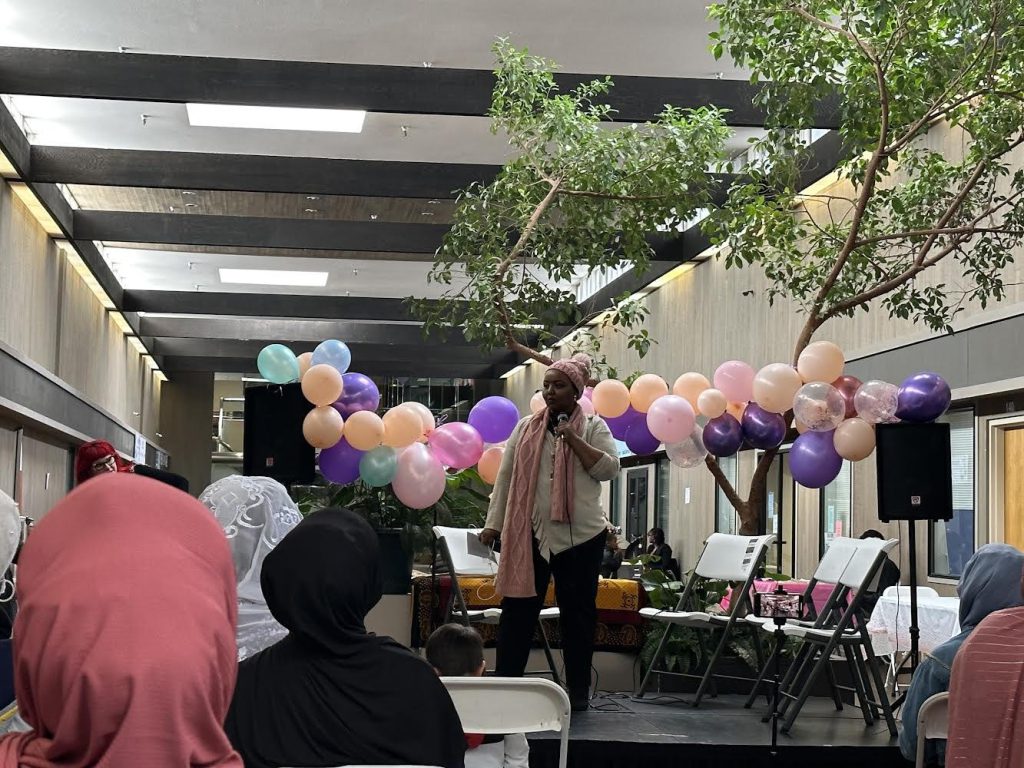
Recently, policy interns at Sahiyo have been interviewing members of the Washington Coalition to End FGM/C to learn more about coalition members’ important work toward policy creation on female genital cutting (FGC). Sahiyo’s policy intern, Sara Khattak, talked to coalition member Dr. Muna Osman, DNP FNP-BC, a prominent advocate in the work to end FGC in Washington state and a respected nurse. Muna has been a leading voice in the Washington movement for over 10 years. Growing up, Dr. Muna Osman was exposed to female genital cutting (FGC) and always opposed the practice, even though she didn’t fully understand it at the time. It wasn’t until she was in graduate school that she decided to make FGC the focus of her studies. “I came from a country that practices. I was in the Middle East, and it happened to me.” As she delved deeper into the issue, Dr. Osman found that doctors in the US often didn’t know how to address FGC or support survivors. This motivated her to develop a curriculum to educate clinicians beyond obstetrics and gynecology (OB/GYN) professionals about the negative short- and long-term impacts of the practice. Gaining the trust of her own community was one of Dr. Osman’s biggest challenges. “At the beginning, there was no community, because the people I’m teaching – even my professors in the graduate school – were like, who cares? It’s a foreign [practice],” she recalled. Over time, Muna found that slowly integrating conversations about FGC into her work with the community-founded safe motherhood program, Mama Aman, helped build that trust. “I started with pregnancy. But after I graduated, we worked with Mother Africa at the community level. People know that I’m volunteering. I don’t work for nobody. I don’t intend to make money off them, so they start listening to me.” Dr. Osman believes that truly making progress requires bridging the generational divide within immigrant communities. “We need to bridge the gap instead of making it bigger and give the respect they deserve, [even if] you’re a kid. You have the knowledge that we didn’t have. Like the parents. Most of the parents came to start a new life. We came to start a new life for our kids. We didn’t come here to become evil again.” Her approach involves empowering youth to assert their bodily autonomy, while also working to educate and engage adults in a respectful way. “We need to empower the kids and tell them, ‘say no.’ I don’t care who you talk to, your teacher, but the teacher needs to know. It’s a cultural practice.” Dr. Osman’s vision for the future includes establishing a comprehensive resource center to support survivors and communities affected by FGC. This center would involve crisis hotlines, therapists trained in cultural humility, and outreach workers embedded within different ethnic communities. “I had a vision that we will have a resource with all this money. To provide the education we need. We go to the communities and we always ask them ‘how much do you know about FGC?” By building a holistic, community-driven approach, Dr. Osman believes we can make real progress in ending FGC in the United States. As she put it, “we cannot say that a one-person approach fits all: We want to be culturally appropriate.” (Dr. Osman shaking hands with Governor Jay Inslee of Washington state after the signing of the Bill on FGC.) Those interested in getting involved can reach out to Dr. Osman directly or connect with the Washington Coalition and other organizations working on this critical issue. We extend our gratitude to Dr. Muna Osman for her invaluable contributions and insights. To learn more about our ongoing work and other interviews, visit Sahiyo’s website.
The forgotten history of female genital cutting in the United States
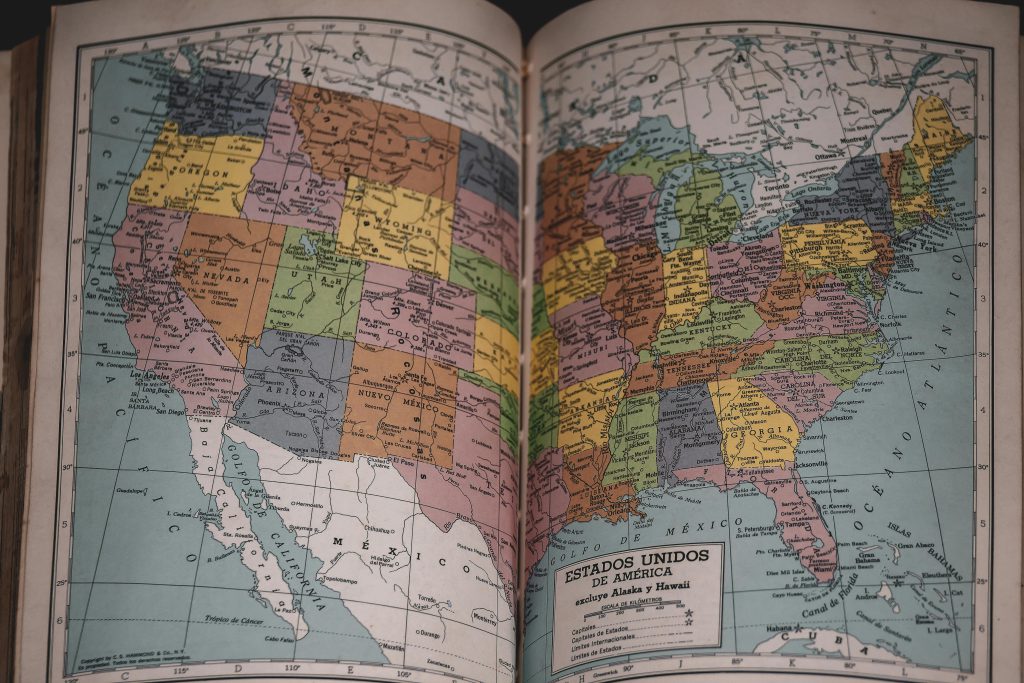
By: Sara Khattak Female genital cutting (FGC) is a practice involving the partial or total removal of external female genitalia or other injury to female genital organs for non-medical reasons. While FGC is a form of gender-based violence that is often mistakenly understood to only occur in certain cultural traditions in Africa and the Middle East, the occurrence of FGC has a history in the U.S. that is less widely known. Understanding the history of FGC in the U.S. is crucial for recognizing the global nature and impact of FGC, and for understanding how to address and end the harmful practice. In the late 19th and early 20th centuries, FGC was practiced in the U.S. and U.K. primarily by medical professionals. Despite the lack of scientific evidence supporting its effectiveness, FGC was often carried out as a medical treatment for various perceived medical and psychological conditions, including hysteria, “lesbianism,” and excessive masturbation. Another practice that should be considered a form of FGC is the “husband stitch.” The “husband stitch” refers to the practice of adding an extra stitch during the repair of a perineal tear or episiotomy after childbirth, ostensibly to tighten the vaginal opening for increased male sexual pleasure. Just this year, a lawsuit was filed in California against an OB-GYN who for decades allegedly performed FGC on patients. These practices were influenced by prevailing attitudes toward women’s sexuality and health of the time period, which included misconceptions about the female anatomy, a tendency to pathologize women’s sexual desires, and a patriarchal medical system that often prioritized male sexual pleasure and control over women’s bodily autonomy and well-being. Clitoridectomies fell out of popularity in the United States in the mid 1900’s, and by 1977 were no longer covered by insurance. At the federal level, however, FGC wasn’t prohibited until 1996. With the passage of a federal law it became illegal to perform FGC on a girl under the age of 18, or for the parent, caretaker, or guardian of a girl under the age of 18 to facilitate or consent to FGC being performed on her. Transporting a girl for the purpose of FGC became a punishable offense in the U.S. in 2013. Even after FGC stopped being a legally recognized medical practice, and Congress passed a federal law making it illegal to perform, there were still reports of FGC being performed by health professionals in secrecy. In fact, in 2018, a medical doctor in Michigan was charged with performing FGC on minor girls who had traveled to Michigan from other states to undergo the practice. It was then reported that Dr. Jumana Nagarwala was a part of a secret network of medical providers who performed FGC on hundreds of girls in the U.S. The case triggered significant legal and ethical discussions in the media, amongst anti-FGC advocates, and legislators, not only about FGC, but also about children’s rights and medical ethics. It was also reported that FGC was occurring in some white fundamentalist Christian communities. The persistence of FGC in these communities underscored the need for a broader societal reckoning with how cultural and religious beliefs intersect with human rights, even within demographics not typically associated with this issue. However, disappointment arose when the 2018 case was eventually dismissed on a technicality, relating to how the original law banning the practice was passed by Congress. This set back highlights the challenges in addressing FGC within the current legal frameworks. As a response, Congress passed the Strengthening the Opposition to Female Genital Mutilation Act of 2020, also known as the Stop FGM Act 2020, to ensure that FGC remained illegal to perform on a girl in the United States. Laws on FGC also vary at the state level. In Connecticut, for example, there are currently no state-level anti-FGC laws. The CT Coalition to End FGM/C, a survivor-led organization, has been working since 2020, advocating for the passage of laws that protect children from FGC and support survivors. Today, various efforts are being made to end FGC in the U.S. through education, advocacy, and community outreach programs. Educational initiatives aimed at informing healthcare providers, educators, and the general public about the harms of FGC and the legal implications of participating in or condoning the practice are being carried out by community-based organizations across the country. In the last 3 years, the Department of Justice, Office of Victims of Crime, funded several programs aimed at preventing and responding to FGC, including grants for community-based organizations and law enforcement training initiatives on the practice. Despite these efforts, significant challenges remain. One of the primary obstacles is the enforcement of the laws against FGC, as it can be difficult to detect or prove cases of the practice occurring. Additionally, there is resistance to ending the practice in some communities where FGC is seen as a social norm that must be done in the name of tradition, as a rite of passage, or due to it being an identity marker. Changing these deeply entrenched social norms requires sustained and sensitive engagement with community leaders and members from impacted communities. Survivors of FGC play a crucial role in the movement to end the practice. By sharing their stories, survivors help to humanize the issue and bring attention to the physical and psychological trauma caused by FGC. Their voices are powerful tools for advocacy and education, helping to shift public perception of the practice and inspire action against it. A large part of Sahiyo’s mission is working with survivors to share their stories and experiences, to inform communities, governments, and the public about the harms of FGC. These stories are critical in helping to enforce and create laws that address FGC because those who have gone through the practice have the most knowledge and understanding of why and how it should be prevented. If you want to learn more about Sahiyo’s work with survivors, listen to survivor stories here.
Reflecting on the 2024 Asian Pacific Institute for Gender Based Violence National Summit
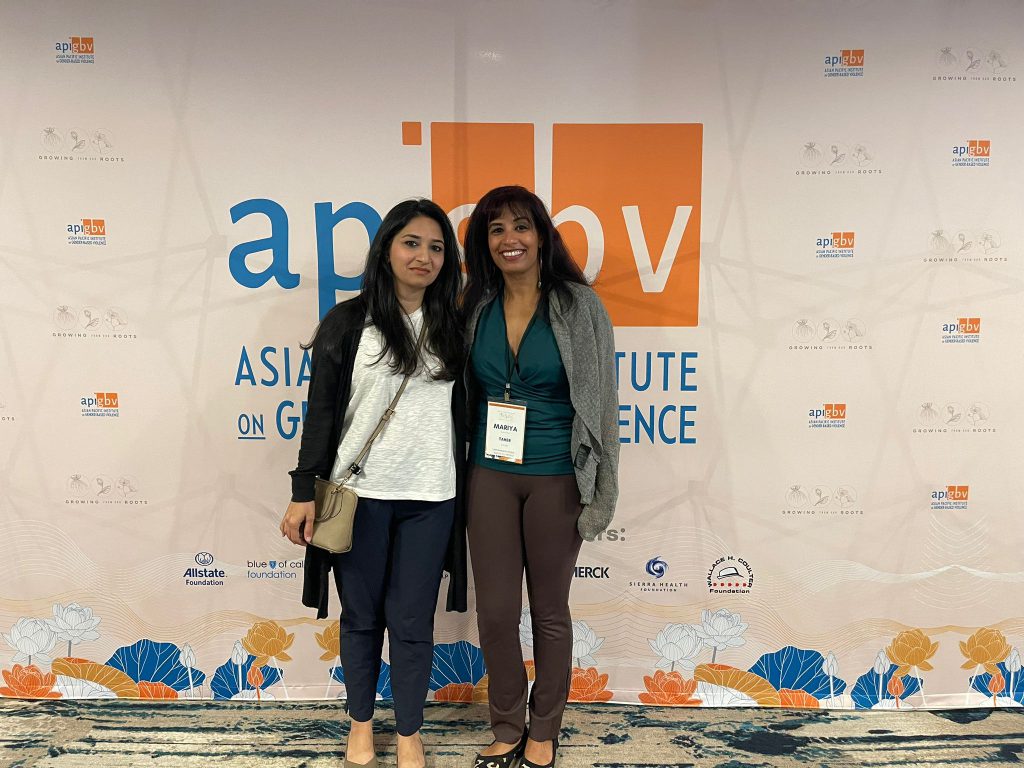
By: Samman Masud In August 2024, I, along with Sahiyo U.S. Executive Director Mariya Taher attended the Asian-Pacific Institute for Gender Based-Violence (APIGBV) National Summit in San Francisco, California. This year’s conference was aptly titled, “Growing from our Roots,” and focused on honoring the founding leaders who came together to form APIGBV in 1993, who have made landmark contributions to the field of gender-based violence and culturally specific advocacy since 1993. The three-day summit welcomed many attendees across the country, including grantees whose community-led, gender-based violence projects are funded by the ARP Support for Survivors Program. As one of the grantees, Sahiyo U.S. has used the funding to grow our Activists Retreat Project, a program that seeks to grow a network of anti-FGC activists and survivor-advocates doing critical advocacy work to end female genital cutting (FGC) in the U.S. The summit was brimming with positive energy with more than 400 attendees present as well as a great agenda, which welcomed speakers and guests from various organizations working in their respective ways to address the culturally specific needs of survivors, advocates and community members. Sharing a physical space, enjoying food together, and having vibrant conversations with folks dedicated to social justice work gave me a sense of community that I so badly needed in this moment, which was laden with anxiety from events both on the domestic and the international political front. And so, I didn’t miss the chance to also join the summer soirée hosted by Survivors, Organizations, Allies, Rising (SOAR),a member collective dedicated to addressing gender-based violence issues among South Asian diaspora in the U.S. We gathered at the beautiful Chandran Art Gallery on Geary Street in chilly San Francisco, had great food, and made plans about the future of SOAR with a focus on areas of improvement, such as increasing youth representation, the importance of data collection and project duplication in our advocacy efforts. There were many portions of the Summit I enjoyed including a workshop on effective storytelling in advocacy work, a session on diversity and equity pitfalls in hierarchical organizations, and a difficult but important conversation on male engagement efforts in gender-based violence work. The discussions in these sessions provided important reminders, likethe need to “keep the lens on the survivor”, a goal that sometimes gets lost due to many challenges that arise with routine operational and administrative work in organizations. Recurring discussions about intersectionality brought to the forefront critical issues in gender-based violence work, for example, the need to fund flanguage access resources to help campaigns addressing communities of color. Stressing the importance of \ survivor-led efforts, and keeping the focus on the growing, intersecting needs of diverse communities in the U.S., helps to improve our work, as I hope to bring more language access to Sahiyo. One way of accomplishing this is hosting a community call in Hindi or Gujarati with members of Bhaiyo, our male engagement initiative at Sahiyo, a goal we hope to achieve later this year. There were many great gatherings and conversations at the Summit, but for me, the highlight was listening to API-GBV Executive Director, Monica Khant in her fireside chat with activist and journalist Helen Zia. A key figure in the Asian American movement and a gender justice advocate, Zia talked about her earlier work in the civil rights movement. Sheemphasized the need to “humanize Asian Americans,” and touched on being Asian in America, which brings with it intersecting forms of oppressions like racism and sexism. As an activist working to address FGC among South Asian community members in the U.S., I could relate very well to Zia’s discussion of the challenges that intersecting dynamics can present to survivors and community members addressing gender-based violence. Zia also stressed the importance of drawing lessons from other marginalized communities in the U.S., such as Black communities that rely on each other in times of crisis. She also emphasized the importance of continuing solidarity work with said communities to solidify the movement and address the root causes of universal, systemic causes of oppression: male privilege and the patriarchy. With that, I realize that gender-based violence work is hard, and gets increasingly difficult given other rapidly changing dynamics of the world. Being in community and listening to the success stories of achievements through solidarity makes the work a little bit easier, and the journey more worthwhile.
Intern Spotlight: Maeve Monger Events & Programs Intern
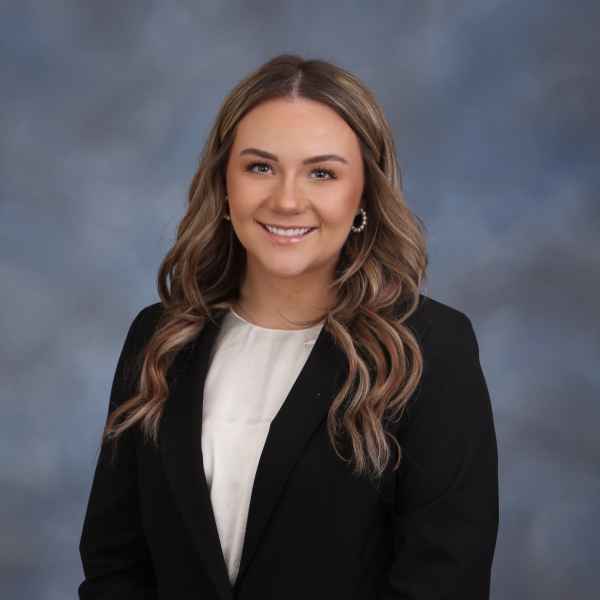
Maeve is currently an undergraduate at the University of Illinois at Urbana-Champaign pursuing a degree in Political Science and Public Relations, with an interest in citizen politics. Through her studies and female-founded extracurriculars, Maeve has become increasingly interested in advocating for women’s rights throughout the world. She is excited to be a part of Sahiyo U.S. and be able to support this progressive change. When and how did you first get involved with Sahiyo? I first became involved with Sahiyo in May 2024 when looking to get my foot in the door for non-profit work. What does your work with Sahiyo involve? Being a Programs and Events Intern with Sahiyo involves a variety of tasks. My role often involves supporting the incredible women here who work selflessly to provide resources and engagement to survivors and fellow advocates against FGM/C. I find pride in being a support system for these women that work for Sahiyo, and that I am able to provide a helping hand in these events to support other women throughout the world. How has your involvement with Sahiyo impacted your life? My involvement with Sahiyo these past few months has drastically impacted my life, opening my eyes to the survivors of FGM/C. The gravity of FGM/C is something that may have been overlooked in my life prior to working with Sahiyo because it is a topic that is not discussed as much as it should be. However, now I have become a huge advocate in supporting survivors of FGM/C. I have always had a passion for women’s rights, but my involvement with Sahiyo has only increased that and gave me a platform to speak out about women’s rights, and more specifically FGM/C. I have found it extremely fulfilling working with Sahiyo and being able to be apart of the fight to end FGM/C. What words of wisdom would you like to share with others who may be interested in supporting Sahiyo and the movement against FGC? Do what makes you passionate. Your participation in the movement against FGM/C is so much more meaningful than you may think. Move with empathy and courage, and your voice will make an impact.
FGM/C in California – Past, Present, and Future

The California Coalition to End FGM/C is hosting a webinar titled, “FGM/C In California – Past, Present, and Future” Date: Friday, October 11th Time: 12:30 – 1:45 pm ET / 9:30 – 10:45 am PT Registration: https://bit.ly/CAcoalitionwebinar Zoom: https://us02web.zoom.us/j/89895243890?pwd=Y6iLxQmEV1OHv77XbSa8XbrSvbgvYa.1 Description: The webinar will be held like a town hall, giving participants the chance to learn in a safe space about the topic of female genital mutilation (FGM/C) through an interactive dialogue. Speakers will include Sahiyo U.S. Executive Director Mariya Taher; Shivangi Mirsa of Equality Now; Senait Admassu and Athia Carrim of the Greater LA FGM Task Force and African Coalition; and Orchid Pusey of the San Francisco Asian Women’s Shelter. Participants will discuss the shortcomings of the current law in California, which was written back in 1996. The coalition will also lay out how the legislation needs to be amended in order to create culturally sensitive and cognizant prevention and support programs to support survivors and those at risk of FGM/C. This Roundtable is an opportunity to share and learn from survivors, advocates, service providers, and community members on the topic of FGM/C and the work being done to address the issue. Furthermore, this event will seek to connect with California legislators who are accountable for upholding and addressing various components of the original 1996 FGM/C law. Through engaging narratives and open conversation, this webinar will help to garner support in building a greater California coalition to end FGM/C that can better advocate for strengthening existing laws on FGM/C in the State. Register for the webinar here. [youtube url=”https://www.youtube.com/watch?v=HTAZ0vrd0cg”]
Takeaways from Sahiyo’s Webinar on Framing FGM/C
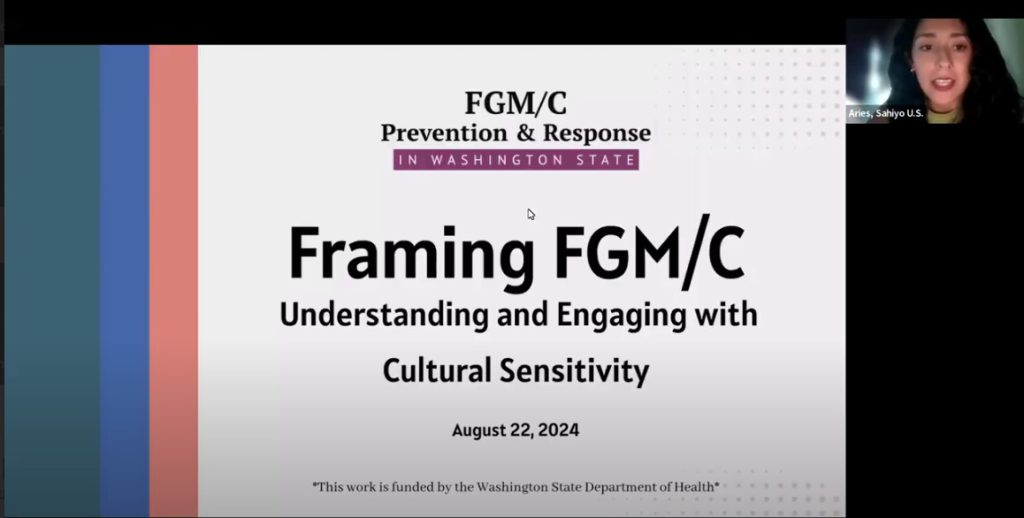
Sahiyo’s recent webinar, “Framing FGM/C: Understanding and Engaging with Cultural Sensitivity,” left a lasting impression on many of the attendees. With over 160 registrants, the session successfully opened up important conversations on how framing can shape our approach to ending female genital cutting (FGC). Feedback from participants shared after the event shed light on how this training has influenced their perspectives and engagement. One of the key takeaways from the webinar was how critical it is to frame discussions around FGM/C in a way that respects cultural contexts while still advocating for change. As one participant shared: “It has opened my eyes to an ongoing issue that I hadn’t been fully aware of before. I plan on using the communication skills presented in this slideshow for organizing and discussing issues.” Throughout the session, participants shared their thoughts and experiences, many remarking on how the personal stories shared deeply moved them. Digital stories shown from the Voices to End FGM/C project sparked meaningful reflections on how the way we talk about FGM/C impacts both the movement and those affected: “Seeing Renee’s story really impacted me and demonstrated the importance of awareness of this world issue.” “Hearing stories always motivates me towards advocacy – the courage is contagious.” This training was funded by the Washington State Department of Health and held in partnerships with the U.S. Network to End FGM/C. Visit the Washington state project website to learn more and watch Renee’s story below! [youtube url=https://www.youtube.com/watch?v=UlO-_WRWZoU]
Reflecting on The 4 Essential Strategies for Self and Community Care in Activism Event with Farzana Doctor

By Rachel Wine Held on September 10, and co-hosted by Sahiyo and The U.S. End FGM/C Network, Farzana Doctor introduced her new workbook: “52 Weeks To A Sweeter Life”. The workbook is dedicated to the caregiver type and provides strategies for self-care and tapping into care via community, both of which are often overlooked in the sphere of activism. Farzana began by sharing her experiences with burnout and vicarious trauma, as well as her personal journey toward self-care as an activist. As she relays in the book, her experience is unique but also ties into the greater experience of grind culture and deprioritization of individual and collective well-being. To combat these challenges, Farzana explores what self-care and community care look like, how they are linked, and highlights the four strategies for well-being she deems essential: [Know] burnout is structurally rooted Understand the links between self- and community-care Normalize burnout and compassion fatigue as human experiences that require our gentle attention Let your nervous system be your guide As an activist, and someone that struggles to take time for myself, I am grateful for the accessible and open-hearted guide Farzana has created. You can buy a copy of Farzana’s workbook here. The event ended with a testimony from Severina Lemachokoti, an anti-FGC activist, human rights defender, and gender activist from the Samburu community in Northern Kenya. Severina’s experiences with the challenges of balancing activism and her personal life provided a successful backdrop for the need of the FGM/C Policy Advocate Care Fund. Recognizing the need to support activists who often provided labor and advocacy to further social justice issues at the expense of their well-being, the U.S. Network in partnership with Sahiyo U.S. launched the FGM/C Policy Advocate Care Fund. The fund’s goal is to ensure advocates are fairly compensated and honored for their invaluable contributions, addressing the gaps in funding and acknowledgment they too often face.
Sahiyo Teams Up With Womankind for an FGC 101 Training
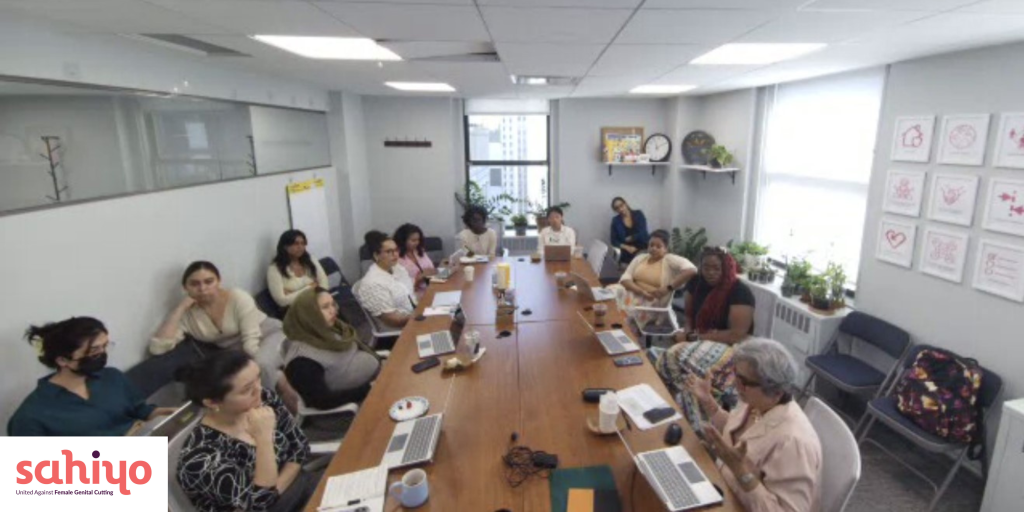
On August 14th 2024, Sahiyo U.S. Advisory Board Member, Kaneez Madraswalla, led a FGC 101 training in collaboration with Womankind in New York City. Womankind is a leading organization dedicated to supporting survivors of domestic violence, human trafficking, and sexual violence. They offer multilingual and culturally responsive services to all with a particular focus on Asian communities. The training served as an important first step in raising awareness about FGC among Womankind’s team. Some attendees shared their personal experiences, whether that involved coming from a culture that practices FGC or knowing someone who has been impacted. This exchange of stories and insights highlighted the importance of the work we’re doing to raise awareness and support survivors. This introductory session laid the groundwork for Womankind to integrate FGC awareness into their community support efforts. By initiating this dialogue, we are opening the door to further education, support, and advocacy, taking crucial steps to protect and uplift those impacted by FGC.
Sahiyo U.S. Participates in Allstate Foundation’s Flash Consulting Day
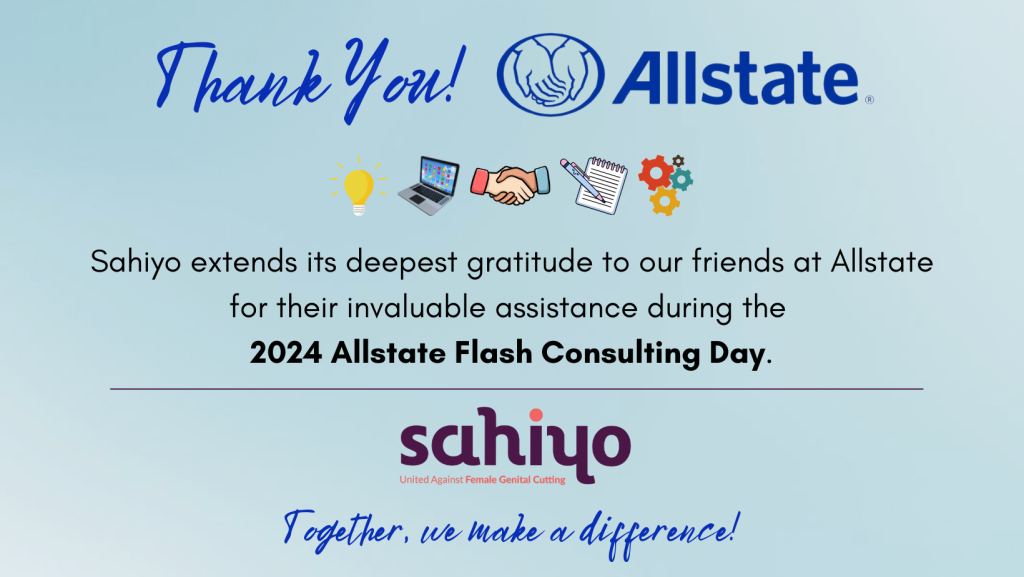
Sahiyo U.S. is honored to have been selected by The Allstate Foundation, in collaboration with Common Impact, as one of 19 nonprofits participating in the July 2024 Flash Consulting Event. During the event, Sahiyo collaborated with a team of Allstate employee volunteers who brought their valuable expertise to the table. Together, they developed a structured employee performance review and assessment process for Sahiyo, helping to identify key evaluation metrics and providing a customizable template tailored to our organization’s needs. We are deeply grateful for their support.
